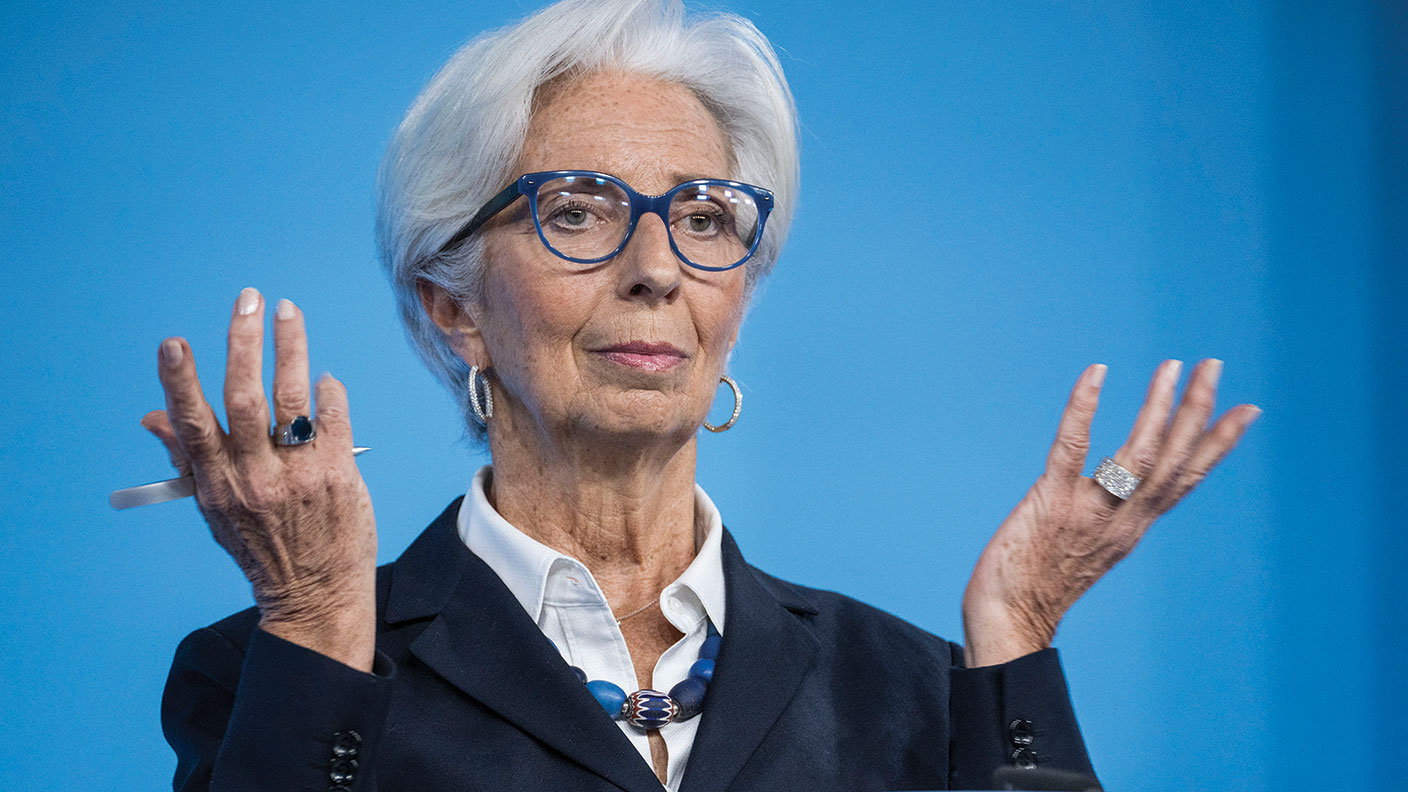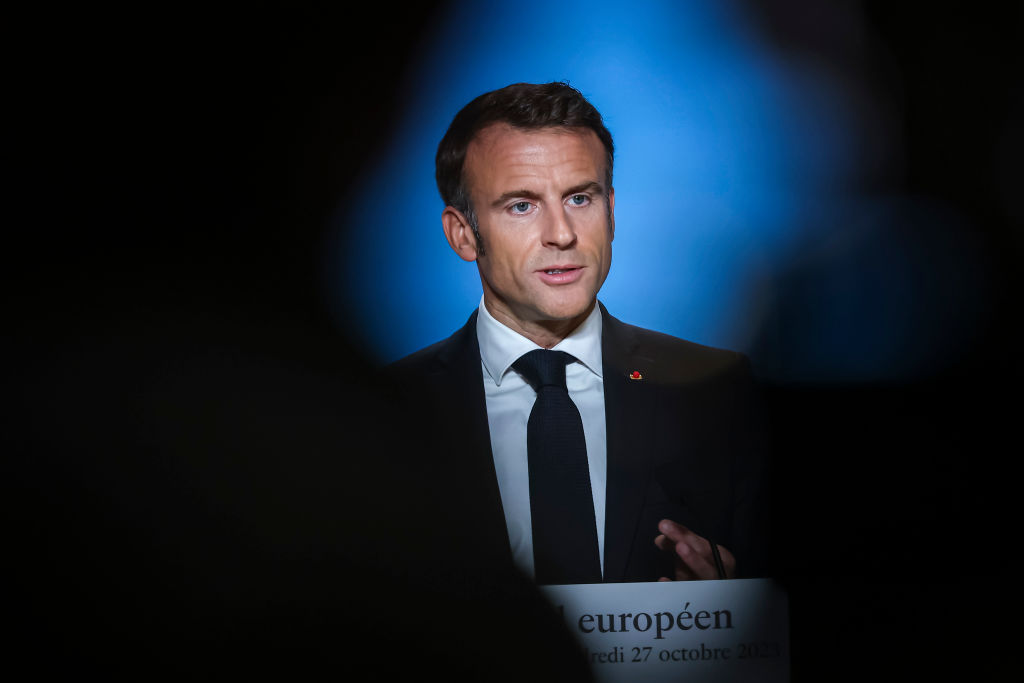A new headache for the ECB
Italy, the eurozone’s third-largest economy, has debt of €2.759trn – almost 150% of GDP. A crisis there would pose an existential risk to the euro.

Get the latest financial news, insights and expert analysis from our award-winning MoneyWeek team, to help you understand what really matters when it comes to your finances.
You are now subscribed
Your newsletter sign-up was successful
Want to add more newsletters?

Twice daily
MoneyWeek
Get the latest financial news, insights and expert analysis from our award-winning MoneyWeek team, to help you understand what really matters when it comes to your finances.

Four times a week
Look After My Bills
Sign up to our free money-saving newsletter, filled with the latest news and expert advice to help you find the best tips and deals for managing your bills. Start saving today!
European Central Bank (ECB) president Christine Lagarde was a synchronised swimmer as a teenager, says Jill Treanor in The Sunday Times. Now, she is “struggling to keep her head above water” as the eurozone’s periphery feels the pressure from tighter monetary policy and Italian and Spanish bond yields soar to eight-year highs.
Last week, the spread between German and Italian ten-year government bond yields spiked to 250 basis points (2.5%). That is well short of the 500-plus basis points that it reached at the height of the 2011-2012 eurozone debt crisis, but it was enough to force the ECB’s governing council to assemble for an emergency meeting in Frankfurt.
The central bankers unveiled a new “anti-fragmentation tool”. The suggestion that the ECB will act to keep spreads down “buys time”, Silvia Merler of Algebris Investments tells the Financial Times. But with details still scarce, it “does not take them out of the corner yet”.
MoneyWeek
Subscribe to MoneyWeek today and get your first six magazine issues absolutely FREE

Sign up to Money Morning
Don't miss the latest investment and personal finances news, market analysis, plus money-saving tips with our free twice-daily newsletter
Don't miss the latest investment and personal finances news, market analysis, plus money-saving tips with our free twice-daily newsletter
Italy’s debt challenge
Italy – whose €2.759trn stock of debt is worth almost 150% of GDP – is the key concern, says Jérôme Gautheret in Le Monde. A debt crisis in the eurozone’s third-largest economy would pose an existential risk to the single currency.
The spike in yields leaves the Italian treasury paying interest rates of roughly 4%. For now Rome is maintaining the confidence of markets, thanks to the leadership of its prime minister, Mario Draghi, Lagarde’s predecessor at the ECB. Yet his “grand coalition” government “is showing increasingly obvious signs of running out of steam” ahead of elections due next year. “The personal aura of ‘Super Mario’ may no longer be of great help in protecting Italy from market storms.”
Comparisons with the eurozone debt crisis are overdone, say Martin Arnold and Amy Kazmin in the Financial Times. Things have changed over the past decade. Italy stands to receive €200bn in grants and cheap loans from the EU’s post-pandemic recovery fund. That will provide an economic boost worth 12.5% of GDP over five years. That help is tied to structural reforms that might drag Italy out of its long economic stagnation. The ECB also has a clearer plan for how to fight eurozone break-up risks – something it sorely lacked in 2011.
Still, the ECB’s recent behaviour doesn’t inspire much confidence, says Jeremy Warner in The Daily Telegraph. Why it is still persisting with asset purchases and negative interest rates when inflation is at 8% “is anyone’s guess”. Perhaps it is because while other central banks can just balance between the twin threats of inflation and stagnation, the ECB must also try to hold the euro together. “Europe’s monetary union is a bit like a bumblebee; aerodynamically it shouldn’t fly, yet somehow it does. For how much longer must again be in doubt.”
Get the latest financial news, insights and expert analysis from our award-winning MoneyWeek team, to help you understand what really matters when it comes to your finances.
Alex is an investment writer who has been contributing to MoneyWeek since 2015. He has been the magazine’s markets editor since 2019.
Alex has a passion for demystifying the often arcane world of finance for a general readership. While financial media tends to focus compulsively on the latest trend, the best opportunities can lie forgotten elsewhere.
He is especially interested in European equities – where his fluent French helps him to cover the continent’s largest bourse – and emerging markets, where his experience living in Beijing, and conversational Chinese, prove useful.
Hailing from Leeds, he studied Philosophy, Politics and Economics at the University of Oxford. He also holds a Master of Public Health from the University of Manchester.
-
 Early signs of the AI apocalypse?
Early signs of the AI apocalypse?Uncertainty is rife as investors question what the impact of AI will be.
-
 Reach for the stars to boost Britain's space industry
Reach for the stars to boost Britain's space industryopinion We can’t afford to neglect Britain's space industry. Unfortunately, the government is taking completely the wrong approach, says Matthew Lynn
-
 No peace dividend in Trump's Ukraine plan
No peace dividend in Trump's Ukraine planOpinion An end to fighting in Ukraine will hurt defence shares in the short term, but the boom is likely to continue given US isolationism, says Matthew Lynn
-
 How have central banks evolved in the last century – and are they still fit for purpose?
How have central banks evolved in the last century – and are they still fit for purpose?The rise to power and dominance of the central banks has been a key theme in MoneyWeek in its 25 years. Has their rule been benign?
-
 Europe’s new single stock market is no panacea
Europe’s new single stock market is no panaceaOpinion It is hard to see how a single European stock exchange will fix anything. Friedrich Merz is trying his hand at a failed strategy, says Matthew Lynn
-
 Do we need central banks, or is it time to privatise money?
Do we need central banks, or is it time to privatise money?Analysis Free banking is one alternative to central banks, but would switching to a radical new system be worth the risk?
-
 The French economy's Macron bubble is bursting
The French economy's Macron bubble is burstingCheap debt and a luxury boom have flattered the French economy. That streak of luck is running out.
-
 The Bank of England can’t afford to hike interest rates again
The Bank of England can’t afford to hike interest rates againWith inflation falling, the cost of borrowing rising and the economy heading into an election year, the Bank of England can’t afford to increase interest rates again.
-
 UK wages grow at a record pace
UK wages grow at a record paceThe latest UK wages data will add pressure on the BoE to push interest rates even higher.
-
 Trapped in a time of zombie government
Trapped in a time of zombie governmentIt’s not just companies that are eking out an existence, says Max King. The state is in the twilight zone too.